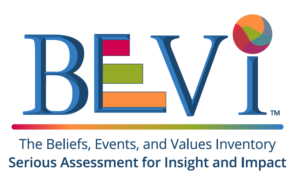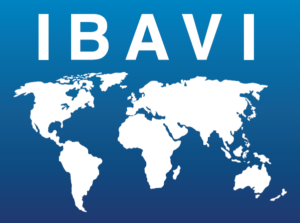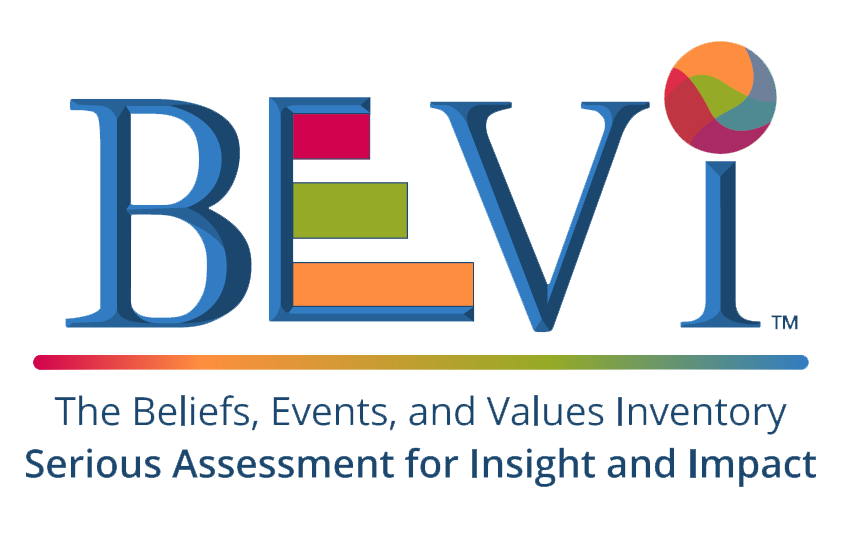

The mission of the nonprofit and nonpartisan International Beliefs and Values Institute or IBAVI is to “explore beliefs and values and how they influence actions, policies, and practices around the world” (see https://www.ibavi.org/). Founded in 2004 after the 9/11 attacks in the United States, and based on a grant from the U.S. Department of Education to study international, multicultural, and transformative learning, the IBAVI “addresses real-world issues of conflict resolution, global education, human rights, religious and cultural understanding, and sustainability through innovative and interdisciplinary scholarship, education, and service.”
For many years, the BEVI has “given itself” to the IBAVI on a pro bono / in-kind basis in order to assist the IBAVI in pursuing its mission and activities around the world. As such, individuals, groups, organizations, and institutions that collaborate with the IBAVI often have access to the BEVI and its AI / VR / reporting systems to pursue a wide range of mission-congruent activities. To see how these BEVI-IBAVI synergies manifest in the real world, consider IBAVI Global, one or our core partnership initiatives.
IBAVI Global: Highlighting the BEVI-IBAVI Partnership
Since its inception in 2004, the IBAVI has developed, implemented, and administered numerous initiatives in collaboration with institutions, organizations, groups, and individuals around the world, including IBAVI Chapters in selected countries and universities. These chapters span the globe, opening up a world of opportunity for collaboration – research, teaching, service, and leadership – among kindred institutions and colleagues. Together, these IBAVI Chapters comprise IBAVI Global (see https://ibavi.org/content/ibavi-global.php).
IBAVI Global projects vary widely, from engaging in values-based education (VbE) research,
coursework, and programs; to leadership and organizational development and evaluation workshops; to the analysis of within- and between-country data on belief/value systems of individuals and groups; to the evaluation and facilitation of international, multicultural, and transformative learning; to many other initiatives that are all congruent with the IBAVI’s mission and rationale. Because all IBAVI Global members have free access to the BEVI, they have been able to use this measure to evaluate and facilitate many different types of activities.
For instance, as university chapters under the auspices of IBAVI Global, the Faculty of Education at the University of South Africa has been collaborating with the Department of Human Development and Family Studies at M.S. Baroda University in India, on an AI-mediated approach to teacher education, an endeavor that is driven by national policy directives in both South Africa and India. Drawing upon the BEVI and its AI / VR / reporting systems, this initiative – Using AI to Teach Teachers: Advancing Quality Education in Africa and India – has been presented at the Fulbright Annual Conference and also will be published as a chapter in a
forthcoming volume for Oxford University Press.
BEVI-IBAVI Partnership Opportunities
Over the years, the BEVI-IBAVI Partnership has been integral to many international collaborations, resulting in publications and presentations, grant-based and curricular development initiatives, and professional convenings on an array of topics. To highlight another example, Applied Global Studies or AGS (https://www.ibavi.org/content/applied- global-studies.php) is a paradigm and pedagogy that is designed to produce self-reflective, socially aware, and globally engaged leaders who have the necessary dedicated, knowledge, skills, and experiences to make a demonstrable difference in the world through the application of informed scholarship and thoughtful practice. Toward such means and ends, the “AGS Model” draws upon the BEVI to help facilitate self-paced and in-depth learning, growth, and development, often through Collaborative Online International Learning or COIL and the IBAVI COIL initiative (see https://www.ibavi.org/content/ibavi-coil.php).
From the standpoint of the IBAVI and its partnership with the BEVI, initiatives like IBAVI Global, Applied Global Studies, and IBAVI COIL are ultimately intended to:
- address the great interest in beliefs and values by academics, policymakers, and the public at large;
- counter a perception that the academy is biased, irrelevant, or elitist;
- highlight the crucial role of higher education in producing an accountable, reflective, and enlightened citizenry;
- facilitate interdisciplinary dialogue among colleagues who share an interest in “beliefs” and “values”, broadly defined;
- build upon related and extant scholarly, grant-based, educational, professional, and outreach activities;
- illustrate how beliefs and values mediate national and international actions, policies, and practices across multiple domains (e.g., religion, politics, gender, culture, environment);
- and, translate research and theory into accessible form and relevant action for a real-world audience.
For more information about the kinds of BEVI-IBAVI initiatives we’ve supported over the years, please see current and recent projects. If you and your colleagues or students are interested in exploring these sorts of collaborative opportunities, please contact us by clicking here, and tell us more about your interests and goals.
